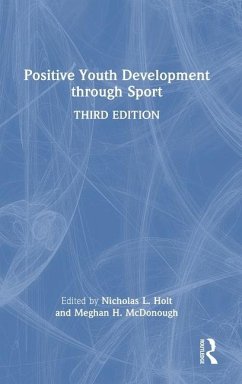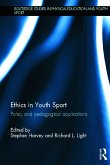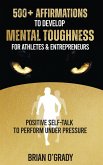Positive Youth Development through Sport
Herausgeber: Holt, Nicholas L.; McDonough, Meghan H.
Positive Youth Development through Sport
Herausgeber: Holt, Nicholas L.; McDonough, Meghan H.
- Gebundenes Buch
- Merkliste
- Auf die Merkliste
- Bewerten Bewerten
- Teilen
- Produkt teilen
- Produkterinnerung
- Produkterinnerung
Cutting through the political rhetoric about the power of sport as a tool for social change and personal improvement, this book offers insight into how and why participating in sport can be good for children and young people.
Andere Kunden interessierten sich auch für
![Positive Pedagogy for Sport Coaching Positive Pedagogy for Sport Coaching]() Richard LightPositive Pedagogy for Sport Coaching200,99 €
Richard LightPositive Pedagogy for Sport Coaching200,99 €![Applied Positive Pedagogy in Sport Coaching Applied Positive Pedagogy in Sport Coaching]() Applied Positive Pedagogy in Sport Coaching200,99 €
Applied Positive Pedagogy in Sport Coaching200,99 €![Getting to Neutral Getting to Neutral]() Trevor MoawadGetting to Neutral24,99 €
Trevor MoawadGetting to Neutral24,99 €![Ethics in Youth Sport Ethics in Youth Sport]() Ethics in Youth Sport211,99 €
Ethics in Youth Sport211,99 €![Values in Youth Sport and Physical Education Values in Youth Sport and Physical Education]() Values in Youth Sport and Physical Education212,99 €
Values in Youth Sport and Physical Education212,99 €![500+ Affirmations to Develop Mental Toughness for Athletes & Entrepreneurs; Positive Self-Talk to Perform Under Pressure. 500+ Affirmations to Develop Mental Toughness for Athletes & Entrepreneurs; Positive Self-Talk to Perform Under Pressure.]() Brian O'Grady500+ Affirmations to Develop Mental Toughness for Athletes & Entrepreneurs; Positive Self-Talk to Perform Under Pressure.19,99 €
Brian O'Grady500+ Affirmations to Develop Mental Toughness for Athletes & Entrepreneurs; Positive Self-Talk to Perform Under Pressure.19,99 €![500+ Affirmations to Develop Mental Toughness for Athletes & Entrepreneurs; Positive Self-Talk to Perform Under Pressure. 500+ Affirmations to Develop Mental Toughness for Athletes & Entrepreneurs; Positive Self-Talk to Perform Under Pressure.]() Brian O'Grady500+ Affirmations to Develop Mental Toughness for Athletes & Entrepreneurs; Positive Self-Talk to Perform Under Pressure.19,99 €
Brian O'Grady500+ Affirmations to Develop Mental Toughness for Athletes & Entrepreneurs; Positive Self-Talk to Perform Under Pressure.19,99 €-
-
-
Cutting through the political rhetoric about the power of sport as a tool for social change and personal improvement, this book offers insight into how and why participating in sport can be good for children and young people.
Hinweis: Dieser Artikel kann nur an eine deutsche Lieferadresse ausgeliefert werden.
Hinweis: Dieser Artikel kann nur an eine deutsche Lieferadresse ausgeliefert werden.
Produktdetails
- Produktdetails
- Verlag: Routledge
- 3. Auflage
- Seitenzahl: 320
- Erscheinungstermin: 26. Juni 2024
- Englisch
- Abmessung: 240mm x 161mm x 22mm
- Gewicht: 646g
- ISBN-13: 9781032498751
- ISBN-10: 1032498757
- Artikelnr.: 70244086
- Herstellerkennzeichnung
- Libri GmbH
- Europaallee 1
- 36244 Bad Hersfeld
- gpsr@libri.de
- Verlag: Routledge
- 3. Auflage
- Seitenzahl: 320
- Erscheinungstermin: 26. Juni 2024
- Englisch
- Abmessung: 240mm x 161mm x 22mm
- Gewicht: 646g
- ISBN-13: 9781032498751
- ISBN-10: 1032498757
- Artikelnr.: 70244086
- Herstellerkennzeichnung
- Libri GmbH
- Europaallee 1
- 36244 Bad Hersfeld
- gpsr@libri.de
Nicholas L. Holt is Dean and Professor in the Faculty of Kinesiology at the University of Calgary, Canada. His research focuses on psychosocial aspects of sport and physical activity among children, adolescents, and their families. Meghan H. McDonough is Professor in the Faculty of Kinesiology at the University of Calgary, Canada. Her research focuses on the role of social relationships in physical activity and well-being with a variety of populations across the lifespan. She has a long-standing line of research examining social processes in physical-activity-based positive youth development programs.
Introduction: The growth of positive youth development through sport. Part
I: Concepts. 1. Toward a transdisciplinary approach to sport for
development: The place of positive youth development. 2. The importance of
person-context fit: A relational developmental systems perspective on
positive development in and through sport. 3. Exploring short-term youth
athlete development through the personal assets framework: Unveiling the
layers of sport development. 4. The challenges, advances, and opportunities
with the study and promotion of life skills transfer. Part II: Measurement.
5. The quantitative measurement of positive youth development in sport:
Methodological considerations as the field ponders its future. 6. The
quantitative assessment of positive youth development through sport. 7.
Assessing the psychometric properties of life skills measures: What is best
practice?. 8. Sport-based interventions for youth: Effectiveness and
opportunities for growth. 9. Qualitative research on positive youth
development in sport. Part III: Contexts. 10. Transitioning from normative
toward emancipatory positive youth development research and practice:
Portugal as an exemplary case. 11. Sport-based life skills development in
South Korea. 12. Positive youth development and talent development:
Pursuing dual intentions in a multilayered environment. 13. Posthumanist
imaginaries for inquiring positive youth development through sport. 14.
Centering Indigenous voices and experiences to advance positive youth
development in sport research. 15. Positive development across the
lifespan. 16. Addressing social vulnerability through sport-based positive
youth development. 17. Promoting mental health in organised youth sport.
Part IV: Evaluation. 18. An experiential approach to facilitative coaching
and teaching social justice life skills. 19. How effective are afterschool
physical-activity-based positive youth development programs? The need for
more rigorous evaluation studies. 20. Community sport as a context for
positive youth development. 21. Evaluation for positive youth development
through sport.
I: Concepts. 1. Toward a transdisciplinary approach to sport for
development: The place of positive youth development. 2. The importance of
person-context fit: A relational developmental systems perspective on
positive development in and through sport. 3. Exploring short-term youth
athlete development through the personal assets framework: Unveiling the
layers of sport development. 4. The challenges, advances, and opportunities
with the study and promotion of life skills transfer. Part II: Measurement.
5. The quantitative measurement of positive youth development in sport:
Methodological considerations as the field ponders its future. 6. The
quantitative assessment of positive youth development through sport. 7.
Assessing the psychometric properties of life skills measures: What is best
practice?. 8. Sport-based interventions for youth: Effectiveness and
opportunities for growth. 9. Qualitative research on positive youth
development in sport. Part III: Contexts. 10. Transitioning from normative
toward emancipatory positive youth development research and practice:
Portugal as an exemplary case. 11. Sport-based life skills development in
South Korea. 12. Positive youth development and talent development:
Pursuing dual intentions in a multilayered environment. 13. Posthumanist
imaginaries for inquiring positive youth development through sport. 14.
Centering Indigenous voices and experiences to advance positive youth
development in sport research. 15. Positive development across the
lifespan. 16. Addressing social vulnerability through sport-based positive
youth development. 17. Promoting mental health in organised youth sport.
Part IV: Evaluation. 18. An experiential approach to facilitative coaching
and teaching social justice life skills. 19. How effective are afterschool
physical-activity-based positive youth development programs? The need for
more rigorous evaluation studies. 20. Community sport as a context for
positive youth development. 21. Evaluation for positive youth development
through sport.
Introduction: The growth of positive youth development through sport. Part
I: Concepts. 1. Toward a transdisciplinary approach to sport for
development: The place of positive youth development. 2. The importance of
person-context fit: A relational developmental systems perspective on
positive development in and through sport. 3. Exploring short-term youth
athlete development through the personal assets framework: Unveiling the
layers of sport development. 4. The challenges, advances, and opportunities
with the study and promotion of life skills transfer. Part II: Measurement.
5. The quantitative measurement of positive youth development in sport:
Methodological considerations as the field ponders its future. 6. The
quantitative assessment of positive youth development through sport. 7.
Assessing the psychometric properties of life skills measures: What is best
practice?. 8. Sport-based interventions for youth: Effectiveness and
opportunities for growth. 9. Qualitative research on positive youth
development in sport. Part III: Contexts. 10. Transitioning from normative
toward emancipatory positive youth development research and practice:
Portugal as an exemplary case. 11. Sport-based life skills development in
South Korea. 12. Positive youth development and talent development:
Pursuing dual intentions in a multilayered environment. 13. Posthumanist
imaginaries for inquiring positive youth development through sport. 14.
Centering Indigenous voices and experiences to advance positive youth
development in sport research. 15. Positive development across the
lifespan. 16. Addressing social vulnerability through sport-based positive
youth development. 17. Promoting mental health in organised youth sport.
Part IV: Evaluation. 18. An experiential approach to facilitative coaching
and teaching social justice life skills. 19. How effective are afterschool
physical-activity-based positive youth development programs? The need for
more rigorous evaluation studies. 20. Community sport as a context for
positive youth development. 21. Evaluation for positive youth development
through sport.
I: Concepts. 1. Toward a transdisciplinary approach to sport for
development: The place of positive youth development. 2. The importance of
person-context fit: A relational developmental systems perspective on
positive development in and through sport. 3. Exploring short-term youth
athlete development through the personal assets framework: Unveiling the
layers of sport development. 4. The challenges, advances, and opportunities
with the study and promotion of life skills transfer. Part II: Measurement.
5. The quantitative measurement of positive youth development in sport:
Methodological considerations as the field ponders its future. 6. The
quantitative assessment of positive youth development through sport. 7.
Assessing the psychometric properties of life skills measures: What is best
practice?. 8. Sport-based interventions for youth: Effectiveness and
opportunities for growth. 9. Qualitative research on positive youth
development in sport. Part III: Contexts. 10. Transitioning from normative
toward emancipatory positive youth development research and practice:
Portugal as an exemplary case. 11. Sport-based life skills development in
South Korea. 12. Positive youth development and talent development:
Pursuing dual intentions in a multilayered environment. 13. Posthumanist
imaginaries for inquiring positive youth development through sport. 14.
Centering Indigenous voices and experiences to advance positive youth
development in sport research. 15. Positive development across the
lifespan. 16. Addressing social vulnerability through sport-based positive
youth development. 17. Promoting mental health in organised youth sport.
Part IV: Evaluation. 18. An experiential approach to facilitative coaching
and teaching social justice life skills. 19. How effective are afterschool
physical-activity-based positive youth development programs? The need for
more rigorous evaluation studies. 20. Community sport as a context for
positive youth development. 21. Evaluation for positive youth development
through sport.








